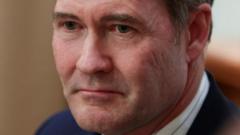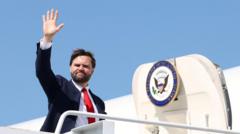The classification of the Alternative für Deutschland (AfD) as a right-wing extremist party has stirred international debate, prompting Germany's government to firmly defend its position against sharp criticism from U.S. politicians, including Vice-President JD Vance and Secretary of State Marco Rubio.
Germany Defends Classification of AfD as Right-Wing Extremist Amid U.S. Criticism

Germany Defends Classification of AfD as Right-Wing Extremist Amid U.S. Criticism
Germany’s Foreign Office responds to U.S. officials' backlash over AfD's extremist designation, citing a need to confront historical extremism.
Germany's Foreign Office has found itself in the spotlight following the classification of the far-right Alternative für Deutschland (AfD) as a right-wing extremist party, sparking a wave of criticism from prominent U.S. officials. This designation has drawn rebuke from the White House, with Vice-President JD Vance lamenting bureaucratic actions as a form of "tyranny in disguise," and Secretary of State Marco Rubio claiming the move is reminiscent of authoritarian suppression.
In an unexpected response, the German Foreign Office took to social media to defend its classification. The agency emphasized its commitment to protecting Germany's democratic principles, noting that the AfD's ideologies, which it described as based on ethnicity and descent, are inherently opposed to the nation’s democratic order. The Bundesamt für Verfassungsschutz (BfV), the intelligence agency responsible for the classification, pointed out that the AfD's stance leads to the exclusion of certain demographics, particularly regarding citizens from predominantly Muslim countries.
The AfD has gained notable political traction, winning 20.8% of the vote in February's federal elections and securing 152 seats in the Bundestag, a record for the party. Following their victory, party leaders, including Alice Weidel and Tino Chrupalla, condemned the classification, alleging that it was motivated by political bias and undermined democratic values. The party's deputy parliamentary leader, Beatrix von Storch, further characterized the classification as typical of "an authoritarian state."
In response to the U.S. critique, the German Foreign Office highlighted that the decision stemmed from thorough investigations and is subject to appeal. "We have learnt from our history that right-wing extremism needs to be stopped," they reiterated, invoking the historical context of the Nazi regime.
The controversy has escalated with calls for a potential ban on the AfD as the German parliament prepares for a vote that could confirm Friedrich Merz, the conservative leader, as chancellor in a coalition government with the Social Democrats (SPD). SPD leader Lars Klingbeil expressed concerns over the AfD's influence, stating that the government must take the threat they pose to democracy seriously.
As this political drama unfolds, the moral and ethical ramifications of classifying parties as extremist continue to spark heated debates across the Atlantic, emphasizing contrasting perspectives on democracy, governance, and political freedom.
In an unexpected response, the German Foreign Office took to social media to defend its classification. The agency emphasized its commitment to protecting Germany's democratic principles, noting that the AfD's ideologies, which it described as based on ethnicity and descent, are inherently opposed to the nation’s democratic order. The Bundesamt für Verfassungsschutz (BfV), the intelligence agency responsible for the classification, pointed out that the AfD's stance leads to the exclusion of certain demographics, particularly regarding citizens from predominantly Muslim countries.
The AfD has gained notable political traction, winning 20.8% of the vote in February's federal elections and securing 152 seats in the Bundestag, a record for the party. Following their victory, party leaders, including Alice Weidel and Tino Chrupalla, condemned the classification, alleging that it was motivated by political bias and undermined democratic values. The party's deputy parliamentary leader, Beatrix von Storch, further characterized the classification as typical of "an authoritarian state."
In response to the U.S. critique, the German Foreign Office highlighted that the decision stemmed from thorough investigations and is subject to appeal. "We have learnt from our history that right-wing extremism needs to be stopped," they reiterated, invoking the historical context of the Nazi regime.
The controversy has escalated with calls for a potential ban on the AfD as the German parliament prepares for a vote that could confirm Friedrich Merz, the conservative leader, as chancellor in a coalition government with the Social Democrats (SPD). SPD leader Lars Klingbeil expressed concerns over the AfD's influence, stating that the government must take the threat they pose to democracy seriously.
As this political drama unfolds, the moral and ethical ramifications of classifying parties as extremist continue to spark heated debates across the Atlantic, emphasizing contrasting perspectives on democracy, governance, and political freedom.




















